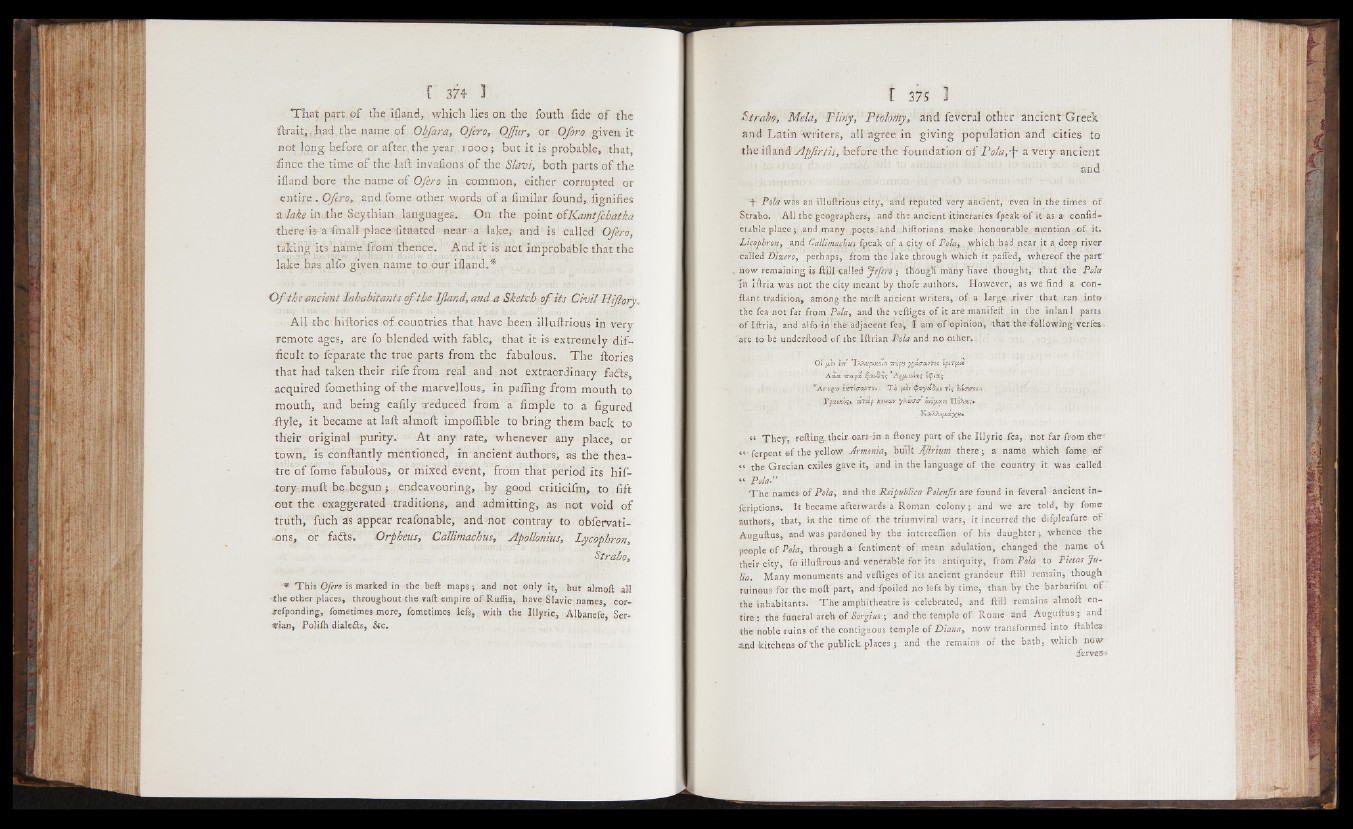
Tba't part of the ifland, which lies on the fouth fide o f the
tfbrait,, had the .name, o f Obfara, Ofero, OJJ'ur, or Oforo given it
not lopg. before or after, the year i o o o j but it is probable, that
fince the time o f the la ft invafions.of the S/avi, both parts o f the
ifland bore the name of Ofero in common, either corrupted or
entire . Ofero,_ and fome other words o f a fimilar found, fignifies
&Jake in,:ithe.Scythian languages-. On the ■■^cm.t-piKamtJcbatka
there is-a fmall place'fituated, near a lake, and is called Ofero,
taking its name from thence. ’ And it is1 not improbable that the
lake has alfo given name to our ifland.*
O f the ancient Inhabitants o f the IJland, and a Sketch of its C ivil Hijlofy.
All the hiftories of countries that have been illuftrious in very
remote ages, are fo blended with fable, that it is extremely difficult,
to feparate the true parts from the fabulous. The ilories
that had taken their rile from real and not extraordinary fadtsi
acquired fomething o f the marvellous, in palling from mouth to
mouth, and being eafily a-educed from a fimple to a figured
ftyle, it became at laft almofl: impoffible to bring them back to
their original purity. A t any rate, whenever any place, or
town, is conllantly mentioned, in ancient authors, as the theatre
of fome fabulous, or mixed event, from that period its hif-
tory mult be.begun; endeavouring, b y good criticifm, to lift
out the exaggerated traditions, and admitting, as not void of
truth, fuch as appear reafonable, and not contray to obfervati-
ons, or fads. Orpheus, Callimachus, Apollonius, Lycophron,
Strabo,
** Th is Ofero is marked in the beft maps; and not only it^ but almoft aM
■the other places, throughout the raft empire o f Ruffia, have Slavic names cor-
refponding, fometimes more, fometimes lefs, with the Ulyric, Albanefe, Serbian,
Poliih dialeds, Sic.
Strabo> Mela, Pliny, Ptolomy, and feveral other ancient Greek
and Latin writers, all agree in giving population and cities to
the iiland Apjirtis, before the 'foundation o f Pola,%f* a very ancient
'and
Pota was an illuftrious city, and reputed very ancient, 'even in the times of
-Strabo. All the geographers, and the ancient itineraries fpeak of it as a confid-
erable place; .and many. poets,:&nd hiftorians make honourable,,mention ,of. it.
Licophron, and Callimachus fpeak 0/ a city of Pola, which had near it a deep river
called Dizero, perhaps, from the lake through which it pafled^ whereof the part'
„ now remaining is Rill called \ fhougn many have thought,' that the Pola
in Iftria was not the city meant by thofe authors. However, as we find a con-
ftant tradition, among the moft ancient writers, of a large river that ran -into ’
the fea not'far from Pola, and the veftiges o f it are manifeft in the inlanl parts
•of Iftria, and 3lfo in the adjacent fea; I am of opinion, that the -following verier
'•are to be underftood of the Iftrian Pola and no other,,
Ot fjbiv E7r iMvpxoio 7T0C8 ^2£Tam? epST/AM
Acta Trapcst Agf* cviiti 0fpi&q
’’Arvpoy exTicavTO. - -To .ptsv (pvyctfrajy t)$ movor-•
IFpaixoq, ctTup xnvuiv yhuaa ovoptys TToAay.
b KaAAittap^y.
66 They, -reftiogrtheir oars~in a Roney part o f the Illyric fea,. not far from the-’
ferpent ©f the yellow Armonia, built Jljlrium there; a name which fome of
«« the Grecian exiles gave it, and in the language of the country it was called
“ PolaP .
The. names: of Pola, and the Reipublica Polenjis are found in feveral ancient in-
fcriptions. It became afterwards a Roman colony; and we are told, by fome
authors, that, in the time o f the triumviral wars, it incurred the difpleafure of
Auguftus, and was pardoned by the interceilion of his daughter; whence the
people of Pola, through a- fentiment of mean adulation, changed the name o i
their city, fo illuftrous- and venerable for its antiquity, from Pola to Pietas Julia.
Many monuments and veftiges of its ancient grandeur ftill remain, though
ruinous for the moft part, and fpoiled no lefs by time, than by the barbarifm o f
the inhabitants. Th e amphitheatre is celebrated, and ftill remains almoft entire
: the funeral arch of Sorgius ; and the temple of Rome and Auguftus ; and
the noble ruins of the contiguous temple of Diana, now transformed into ftables
and kitchens of the publick.--.pj aces 5 and the remains of. the bath, which nowiferves*